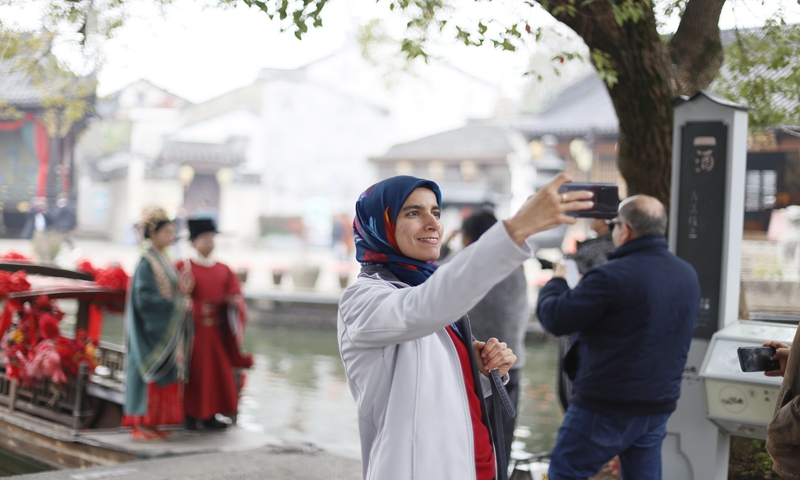UN, Global South officials, experts explore how development drives human rights progress via China visit

How does development promote progress in human rights? Over the past two weeks, commissioners and experts from the Global South and the United Nations sought answers through discussions, site visits and dialogue meetings in Beijing and East China's Zhejiang Province.
The Hernán Santa Cruz Dialogue on Economic, Social and Cultural Rights (ESCR) brought together ministerial and department-level officials from nearly 50 countries and regional organizations, including the Republic of Congo, Côte d'Ivoire, Mauritania and Yemen, as well as UN experts and officials from the Office of the High Commissioner for Human Rights.
Participants from abroad engaged in discussions on economic, social and cultural rights in Beijing, before they toured several locations in Zhejiang.
The event was held by the Ministry of Foreign Affairs of China and the Office of the United Nations High Commissioner for Human Rights.
"It is important to adhere to a people-centered approach, step up efforts on the ESCR and focus on addressing uneven development. It is also important to strengthen solidarity and coordination, and increase the support to developing countries from developed countries to make sure that no one is left behind," Wang Yi, Member of the Political Bureau of the Communist Party of China Central Committee and Minister of Foreign Affairs of China, noted in a written address at the opening ceremony of the dialogue, according to the Xinhua News Agency.
Comprehensive development
The three-and-a-half-day trip to Zhejiang left a profound impression on the visiting participants.
Located in East China's coastal region, Zhejiang is one of the most economically developed provinces in China, renowned for its advanced manufacturing and commodity trade. In 2023, the province's GDP totaled 8.26 trillion yuan ($1.13 trillion), with a per capita GDP of 125,043 yuan, according to a report released by Zhejiang Provincial Bureau of Statistics in September 2024.
Zhejiang has also been a pioneer of China's reform and opening-up. The province has successfully transitioned from a traditional industrialized economy to a modern, service-oriented, innovation-driven, digital economy.
During their first stop in Zhejiang, the participants visited China's e-commerce giant Alibaba's headquarters in Hangzhou, where they witnessed the dynamism of China's e-commerce sector. They observed real-time orders from across the country and reviewed the outcomes of the recent Double 11 Shopping Festival.
The group also explored how the e-commerce model supports the sales of rural products and contributes to charity, fostering social welfare initiatives.
In Yucun, a village in Anji county where the concept "Lucid waters and lush mountains are invaluable assets" was first proposed, the participants learned how ecological improvements have benefited local residents, becoming a backbone of economic development. Once plagued by environmental degradation due to mining, the village is now picturesque and attracts a stream of tourists. In 2023, Yucun recorded a total village collective economic income of 22.47 million yuan and a per capita income of 71,000 yuan.
Amid the scenic mountains and rivers, participants eagerly pulled out their phones to capture memorable moments.
Aslan Abashidze, a member of the UN Committee on Economic, Social and Cultural Rights, said that Zhejiang's success exemplifies "how a strong economic foundation contributes to people's happiness and well-being."
Abashidze highlighted China's ability to turn theoretical discussions at the international legal level into practical realities. "What I have seen here serves as an excellent example for other countries, especially those from the Global South, demonstrating how to implement ideas discussed at platforms like the United Nations," he told the Global Times.
He also praised China's Belt and Road Initiative, calling it a transformative action plan that promotes mutual benefits and development. "China's approach to fostering international cooperation sets a high standard," he said.
By the people, for the people
In addition to economic development, China's grassroots governance and the inheritance of traditional cultural values also gave participants much to ponder.
They visited the Fengqiao community in Shaoxing, the birthplace of the Fengqiao model.
Standing amid the beautiful Jiangnan traditional pavilions and bridges over flowing water, the exhibition hall in Fengqiao community provides a detailed introduction to the origins of the Fengqiao model and its development in the New Era.
Created by people in Fengqiao, a small town in Zhejiang, some 60 years ago, the "Fengqiao model" gained recognition for promoting the resolution of disputes by people at the community level. It has since been promoted across the country.
Emmanuel Nweke, Minister Counsellor on Drugs, Crime and Human Rights at the Ministry of Foreign Affairs of Nigeria, shared his observations with the Global Times. "In Nigeria, conflict resolution at the community level is less common these days, as modern systems often require turning to the police or courts, which sometimes fail to restore peace," he said. "When disputes are resolved within the community, the outcomes tend to be more lasting."
He emphasized the challenges faced by developing countries, where "the priority often shifts to development over civil and political rights, as poverty and underdevelopment leave many unable to meet basic needs."
Zineb Ouaaba, Studies Officer at the Interministerial Human Rights Department in Morocco, expressed interest in the Fengqiao model's development and its influence across other parts of China.
"The exhibition guided us through a social justice model grounded in community practices and the values of local people," she told the Global Times. "It ensures that everyone becomes an actor, not merely a participant. I am not just a recipient of services," she said.